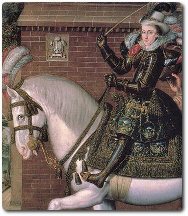The White Devil Contents
- Social / political context of The White Devil
- Religious / philosophical context of The White Devil
- The Theatre
Discourses in the play
Discourse is the language attached to a given type of social practice (e.g. legal discourse, medical discourse, religious discourse.) The White Devil is a play set in a particular time and place and it uses the language of several such discourses to convey its context to the audience.
Legal language
It is possible that Webster himself studied law at some time in his life, although he probably never practised. However, his interest in the law is evident through The White Devil:
- In the trial of Vittoria, one of the characters is a lawyer
- He appears again in Act 3 sc 3, where he is mocked for his use of Latin and then for his elaborate and pompous use of language. Francisco says to him:
(Speaks this in scorn) ‘Sir‘Fustian' was a pun on linen cloth also meaning high-sounding, inflated language. ‘Buckram' was the coarse material traditionally used for lawyers' bag.
Put up your papers in your fustian bag –
Cry mercy sir ‘tis buckram –'
- In Brachiano's dying speeches (Act 5 sc 3) he refers to greedy lawyers who will try to make money out of the fall of Flamineo:
In a gown whipt with velvet, stares and gapes
When the money will fall.'
Religious language
The White Devil is set in Italy, a Catholic country. The use of the Catholic context showing religious corruption fitted the ideas many in the audience would have about Catholicism. (See Religious / philosophical context > Attitudes to Catholicism > Catholic stereotypes in The White Devil.)
There are references to the election of Cardinal Monticelso as the new pope in Act 4 sc 3 and to Roman Catholic practices such as confession to a priest. Lodovico in Act 4 sc 3 agrees to give information to Monticelso only in the form of confession:
But as a penitent sinner. What I utter
Is in confession merely; which you know
Must never be revealed.'
Religious terms often initiate a discussion on morality. In Act 5 sc 3 Marcello comments on the fact that his brother, Flamineo, broke his mother's crucifix necklace as a baby. This comes just before Flamineo kills Marcello.
Medical discourse
Jacobean medical practices were often of dubious efficacy. The character Doctor Julio is referred to as ‘A poor quack-salving knave', the term ‘quack' indicating that he is not a genuine doctor. In fact, he has been hired for his knowledge of poisons.
There are references to current medicinal practices e.g. the use of:
- Mummia, a medicine made from dead flesh
- Garlic
- Stibium (antimony)
- Cantharides, a medicine made from beetles
- Unicorn's horn, the powder of which mythical beast was thought to have medicinal properties.
Military terms
War and the prospect of war are referred to several times in the play. The audience for Webster's plays would have been familiar with war, since there had been the threat of a Spanish invasion during Elizabeth I's reign and the threat of ensuing religious wars continued (see Social/political background > Reign of James I > The problems of James I's reign: Discontent). There were also wars in Italy throughout the seventeenth century (see Social/political context > Renaissance Italy > War, a spur to a new culture).
 There is some discussion of the nature of war at various points in the play. The young Giovanni, son of Brachiano, boasts of how he will conduct a war when he is old enough. His idealism in not demanding a ransom for prisoners is gently reproved by his uncle, Francisco, showing how little room there is for such idealism in wartime. However, Webster's original audience would recognize that Giovanni is echoing the chivalry associated with James I's eldest son, Henry Frederick, Prince of Wales. Like Giovanni he also had upright religious views and was interested in military affairs and how the nation should be ruled.
There is some discussion of the nature of war at various points in the play. The young Giovanni, son of Brachiano, boasts of how he will conduct a war when he is old enough. His idealism in not demanding a ransom for prisoners is gently reproved by his uncle, Francisco, showing how little room there is for such idealism in wartime. However, Webster's original audience would recognize that Giovanni is echoing the chivalry associated with James I's eldest son, Henry Frederick, Prince of Wales. Like Giovanni he also had upright religious views and was interested in military affairs and how the nation should be ruled.
Later in the play, Francisco himself considers how to conduct a war. When Monticelso urges him to seek revenge on Brachiano for the death of Isabella, his sister, he claims that he cannot impose the burden of war on his subjects:
Committed in the horrid lust of war,
He that unjustly caused it first proceed
Shall find it in his grave and in his seed.'
This introduces the idea of the just war which was a topic of contemporary interest.
More on just war: The just war theory is a largely Christian philosophy that attempts to reconcile three ideas:The theory specifies conditions for judging if it is just to go to war, and conditions for how the war should be fought.
- That taking human life is runs counter to the sixth commandment which forbids murder
- That states have a duty to defend their citizens and defend the rule of law
- That protecting innocent human life and defending important moral values sometimes requires willingness to use force and violence.